Development of the Company’s regions of operation
KMG contributes to social and economic development in the regions of its operation. The Company actively cooperates with local authorities, maintains an ongoing dialogue with key stakeholders, and focuses on training and development of young skilled specialists. It also implements social initiatives for KMG Group’s employees and is committed to supporting domestic producers through off-take agreements. KMG Group companies invest in the development of socially important facilities, construction of sports complexes, regional social and economic development, etc. under subsoil use contracts and the Comprehensive Development Plan.
The subsoil use contracts signed by KMG subsidiaries provide for significant investment in developing the regions of operation and in social support to vulnerable population groups. The Company’s subsidiaries and associates also provide funds to local executive bodies, which are further distributed in line with the needs of local communities under agreements and memoranda concluded with the akimats of the respective regions. On top of that, KMG makes timely progress on its commitments under the Zhanaozen Comprehensive Development Plan. In 2021, the Group allocated KZT 5 bln for this purpose.
As part of the Comprehensive Development Plan, JSC OzenMunaiGas has financed a number of projects, including the expansion of the utility maintenance function (to 350 jobs) of Ozeninvest, Zhanaozen Akimat’s utility company, subsidising the dormitory rent for Zhanaozen youth working and living in Aktau, acquisition of housing in Aktau to provide social housing for vulnerable population groups relocating from Zhanaozen, and construction of sports facilities in Zhanaozen subject to design documents, for a total amount of KZT 3 bln.
JSC OzenMunaiGas allocated KZT 900 mln to finance the development of social infrastructure in Zhanaozen and the Karakiya District.
JSC Embamunaigas invested KZT 200 mln to build a community centre for 300 visitors in Tasshagyl; KZT 132 mln to build a sports facility for 160 visitors in Makhambet; and KZT 83 mln to build a medical aid post in Asan.
JSC Mangistaumunaigaz invested KZT 300 mln to support social, economic and infrastructure development of the Mangystau Region as part of an agreement with the region’s akimat. Moreover, it allocated KZT 60 mln to provide the region’s residents with meat at affordable below-market prices by purchasing finisher cattle from local private subsistence and peasant farms, and to assist local agricultural facilities with stocking cattle feed amid the drought by providing 100 tonnes of diesel fuel to compensate for transport expenses.
JV Kazgermunai LLP invested around KZT 145 mln in social, economic and infrastructure development of the Kyzylorda Region.
JSC Karazhanbasmunai allocated KZT 230 mln to support social, economic and infrastructure development of the Mangystau Region as part of an agreement with the region’s akimat.
Kazakhturkmunay LLP and Kazakhoil Aktobe LLP invested KZT 45 mln and KZT 100 mln, respectively, in social, economic and infrastructure development of the Aktobe Region.
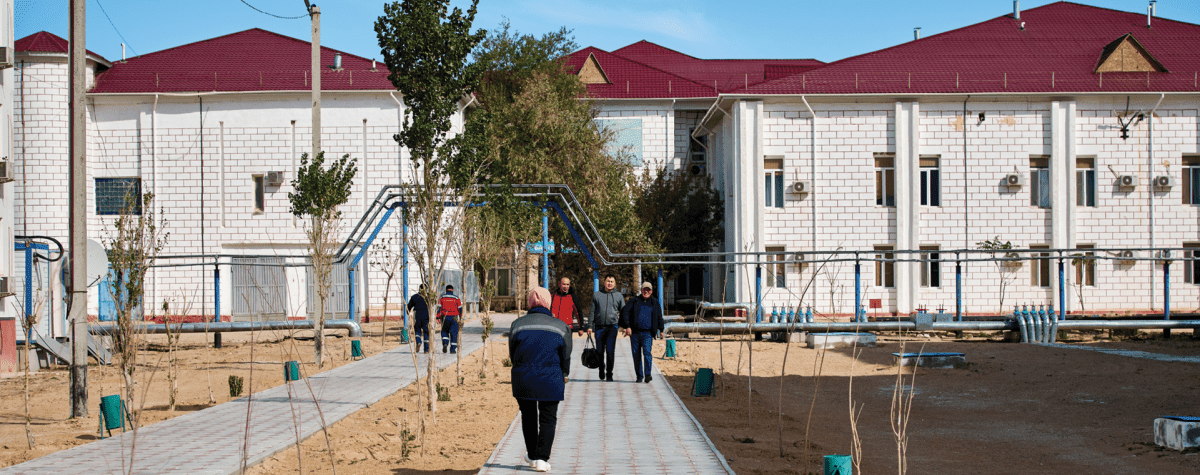
Charity and sponsorship
Samruk-Kazyna Trust Social Development Foundation, Samruk-Kazyna Group’s unified charity operator, is responsible for the Company’s charitable and sponsorship activities.
Samruk-Kazyna Trust’s charitable initiatives focus on assisting people and communities in the social and medical sectors, developing media and cultural communities, fostering human resources, enhancing labour and inter-ethnic relations, investing in sustainable development, and supporting regional business initiatives.
COVID-19 response
Since the beginning of the COVID-19 pandemic, KMG has introduced a number of mechanisms and measures to prevent the spread of the infection across the Group. The accumulated experience in countering COVID-19 enabled us to avoid production disruptions in 2021.
In the reporting year, the Group continued implementing a set of preventive measures in line with pandemic response regulations.
KMG Group supported the state vaccination campaign. It undertook steps to encourage vaccination among its employees in order to build herd immunity and ensure uninterrupted operation of the Group’s production facilities.
As at the end of 2021, 50,000 employees of KMG Group (or 76% of the total headcount) were vaccinated. 48,000 employees (73%) had received both doses of the vaccine.
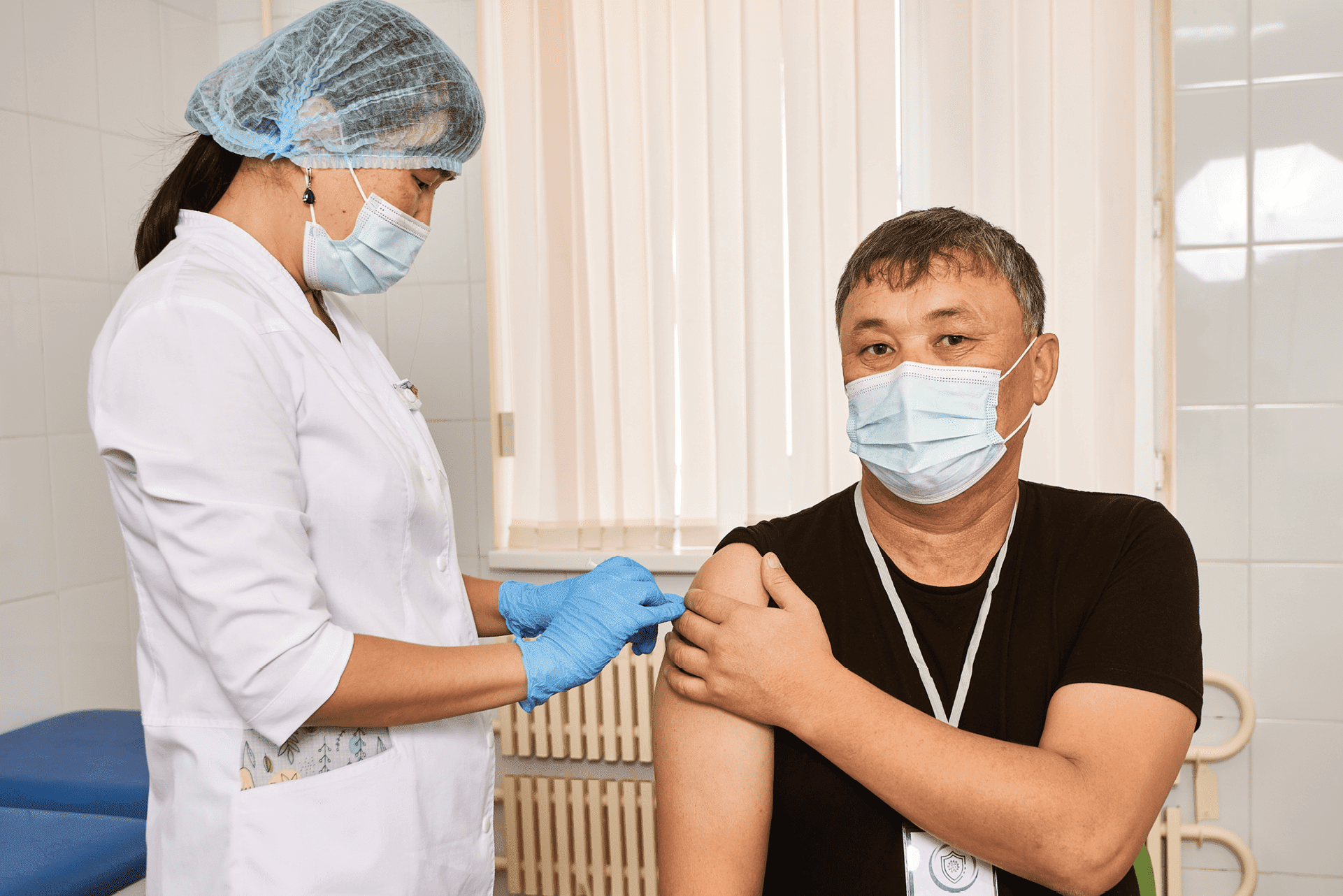
Student and young talent engagement
Amid the ongoing globalisation and changes in the industry, graduates are expected to be increasingly more qualified. KMG Group companies actively cooperate with educational institutions to develop and promote a practice-oriented approach to training a new generation of specialists and unlocking students’ professional skills. The Company implements a dual education programme, wherein students get hands-on workplace experience thanks to production facilities and educational institutions joining forces to foster highly skilled employees. In
With the Kazakhstan Petrochemical Industry Development Programme currently underway and the planned launch of two large petrochemical plants in the Atyrau Region, the Company is taking active steps to create a modern petrochemical educational cluster together with Atyrau Oil and Gas University.
Atyrau Refinery led a complete upgrade of the infrastructure and equipment of the university’s former Chemistry and Chemical Technology department, including full refurbishment of lecture halls and chemical laboratories, their kit-out with furniture and equipment, and outfitting of auxiliary rooms. The university now houses the Institute of Petrochemical Engineering and Ecology and 12 new labs with state-of-the-art equipment to help students acquire practical skills in using instrumental methods of physical and chemical analysis to study oil, gas and refined products.
In 2017, Samruk-Kazyna Fund initiated the Zhas Orken programme aimed at training and developing a new generation of managers with a broad set of professional skills and the Digital Summer programme that focuses on attracting young talent to the Fund’s digitalisation projects.
The key strong point of these programmes is the opportunity to learn faster with the help and support from highly experienced mentors working at the Company. As part of the Zhas Orken programme, young specialists undergo rotation at the Fund’s four different sites across the country.
Since the launch of the programmes, 61 young specialists have studied at KMG Group under the Zhas Orken programme (with 15 becoming employees), and 18 specialists, including students, have received training under the Digital Summer programme (with three becoming employees later on).
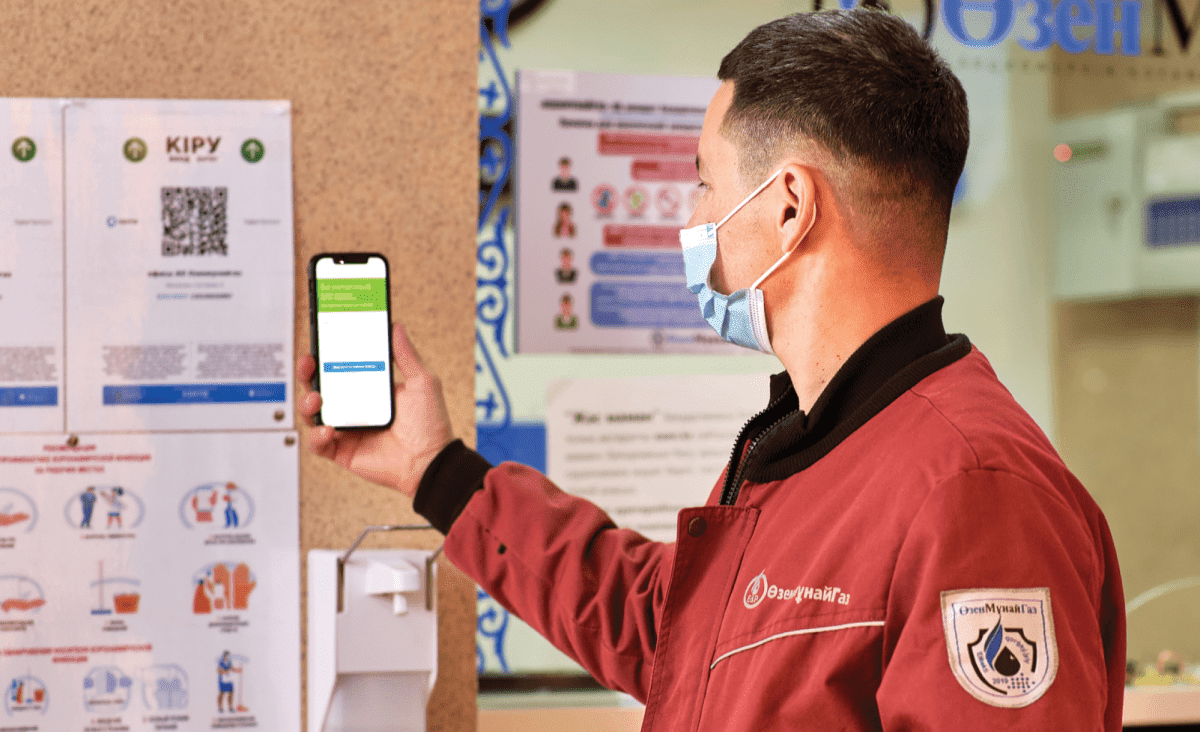
Unified internal communications system
KMG Group has in place the Regulations on the Unified System of Internal Communications aimed at establishing and maintaining feedback between employers and employees of the Group, as well as improving social and psychological environment for the Company’s staff.
The Group has adopted standard regulations on the unified system of internal communications in order to create and maintain effective mechanisms enabling direct communication between employers and employees at subsidiaries and associates, timely inform employees about the goals and objectives of activities carried out at subsidiaries and associates, communicate the current situation in the organisation to employees, and monitor the social and psychological climate among employees of subsidiaries and associates.
The principal internal communication tools are:
- planned reporting meetings between the chief executive officer and employees (held twice a year)
- ad-hoc meetings between management and trade unions/employees to discuss urgent issues requiring immediate decisions
- corporate information website and newspaper
- a screen for video announcements; a box for employees’ proposals
- teambuilding: professional skills competitions, sporting events, corporate parties, etc.
The Regulations enable any&nbps;employee to ask questions and receive a timely response.
During the pandemic, all communication systems (meetings with employees, CEO blog, information boards, boxes for proposals and requests) remained operational.
Social support for employees
KMG Group has a Standard Collective Bargaining Agreement Form for Group companies that defines the types of social support for employees of KMG subsidiaries and associates and rules for providing it.
According to KMG Group collective bargaining agreements, there are 35 types of social support. In the reporting period, all the terms and conditions of collective bargaining agreements were met and maintained across all KMG enterprises, regardless of their financial and economic situation. The amount of social benefits significantly increased compared to previous periods.
Over 2021, KMG Group companies spent approximately KZT 22 bln on social support for their employees, including social support for unemployed retirees.
In addition to providing social support to its own employees, the Company decided to introduce minimal social benefits for contractor employees starting 1 January 2022. These include payments related to the birth of children, assistance for school children at the start of the school year and for children with disabilities, benefits tied to Nauryz and 8 March holidays, etc.
| Indicator | % |
|---|---|
| Health insurance for employees and their families | 22 |
| Financial assistance related to the birth of children / pregnancy and childbirth / parental leave / payment for preschool institutions / education of employees' children / purchase of school supplies for the start of the school year | 16 |
| Financial assistance to large families and low-income families / workers in special need / disabled people, workers with a spouse or children with disabilities from childhood (1st, 2nd and 3rd groups) in connection with the death of an employee / employee's family members / for organising a funeral / due to general inability to work or disability | 14 |
| Financial assistance to retirees | 10 |
| Financial assistance to pay for medical treatment / surgery when the cost of treatment/surgery exceeds the limit established by the voluntary medical insurance programme / to internationalist soldiers (Afghans) / Chernobyl liquidators / temporary disability benefits | 9 |
| Recreation / improvement of employees' housing conditions | 9 |
| Other types of social support | 20 |
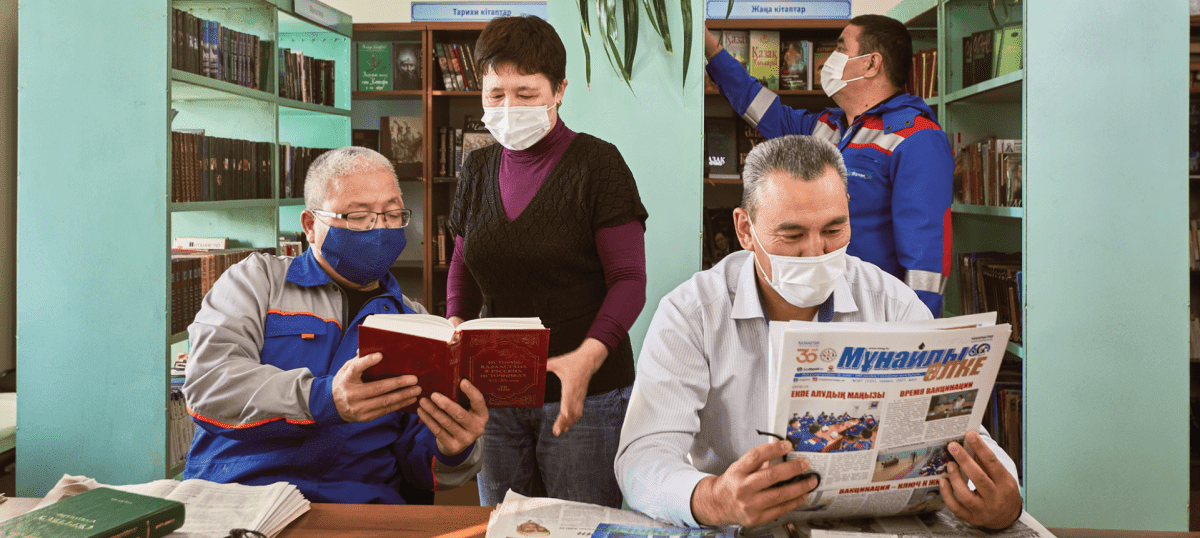
Subsidiary and associate interaction with contractors
Well aware of potential negative consequences of contractor downtime during the pandemic, KMG took steps to ensure maximum support for its contractors by ordering works to maintain employment as it balanced own corporate interest and the socio-economic environment.
To ensure salary growth for contractor employees, KMG recommends its subsidiaries and associates to set requirements to contractors at the contract signing stage so as to keep monthly wage/salary rates at least at 70% of the monthly wage/salary rates for similar jobs at KMG subsidiaries and associates. To that end, KMG Group allocated KZT 3.8 bln in 2021 and plans to spend up to KZT 10.1 bln more in 2022.
Furthermore, to ensure stable relationship with contractors working at its sites, the Company implements standard regulations on interaction between KMG subsidiaries and associates and contractors. The document focuses on protecting social and labour rights of contractor employees through compliance with established labour guarantees.
The regulations are mandatory for KMG subsidiaries and associates when concluding and monitoring performance of contracts with contractors that have employees of their own. The regulations will be included in contracts between KMG subsidiaries and associates and their contractors.
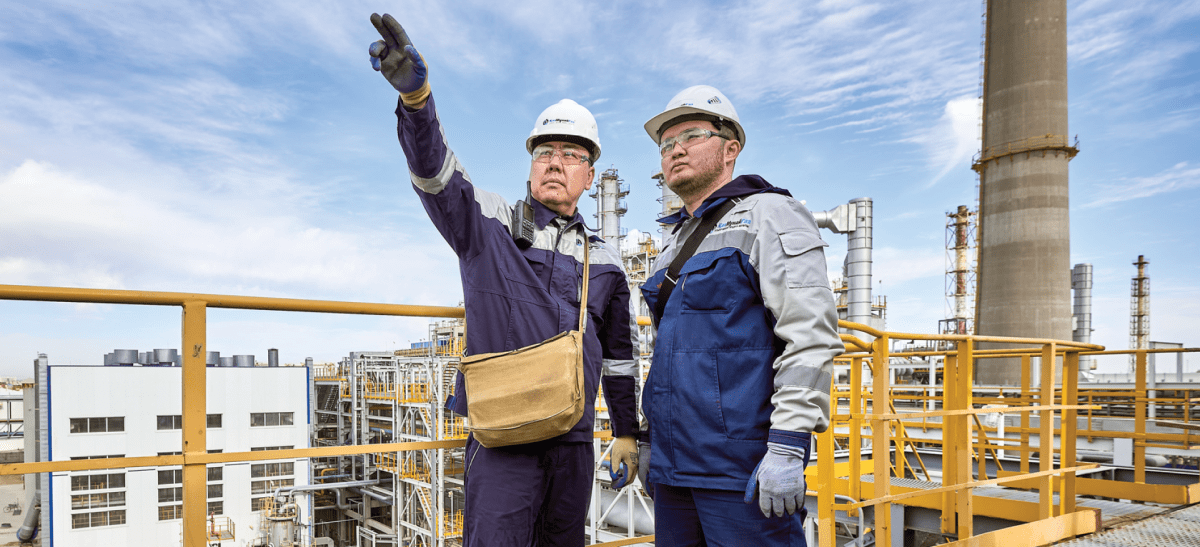
Company-wide events
KMG Group holds various events every year. For example, we organise a corporate sports competition and the Uzdyk Maman competition to promote a healthy lifestyle and professional development.
Moreover, there are Youth Councils operating across the Group. Their members take part in different cultural events, workshops, etc.
However, no mass events were held during the COVID-19 pandemic.